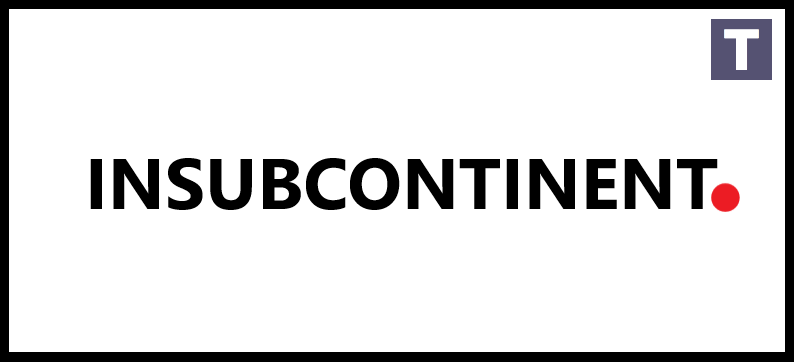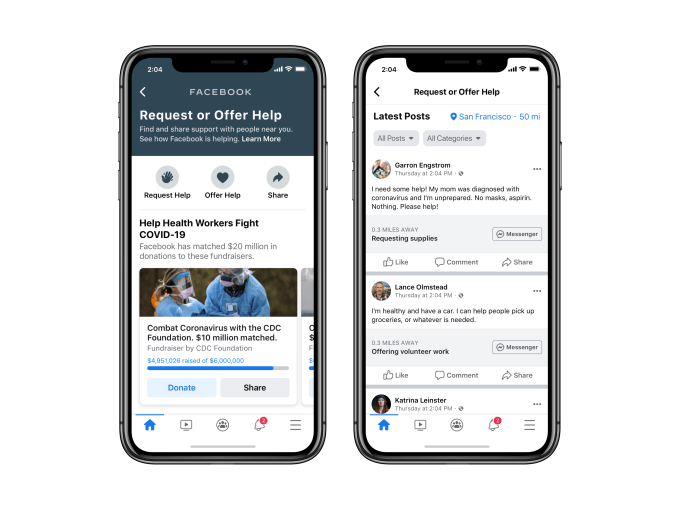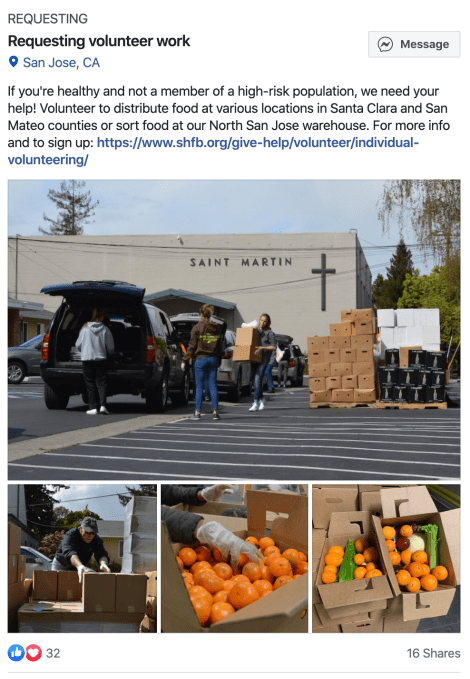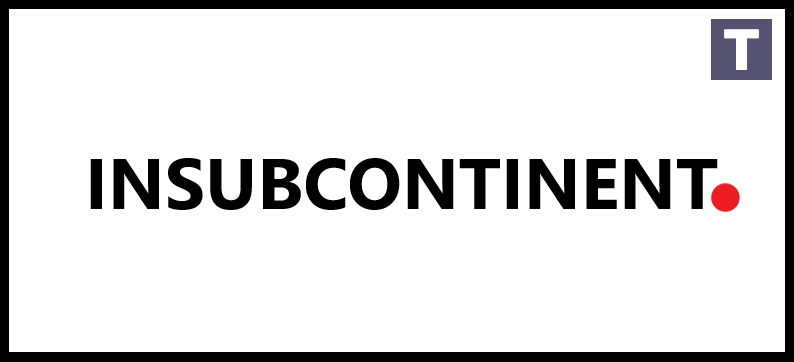Music
Trailers
DailyVideos
India
Pakistan
Afghanistan
Bangladesh
Srilanka
Nepal
Thailand
StockMarket
Business
Technology
Startup
Trending Videos
Coupons
Football
Search
Download App in Playstore
Download App
Best Collections
Technology

Houseparty has been a smashing success with people staying home during the coronavirus pandemic who still want to connect with friends.
The group video chat app, interspersed with games and other bells and whistles, raises it above the more mundane Zooms and Hangouts (fun only in their names, otherwise pretty serious tools used by companies, schools and others who just need to work) when it comes to creating engaged leisure time, amid a climate where all of them are seeing a huge surge in growth.
All that looked like it could possibly fall apart for Houseparty and its new owner Epic Games when a series of reports appeared Monday claiming Houseparty was breached, and that malicious hackers were using users& data to access their accounts on other apps such as Spotify and Netflix.
Houseparty was swift to deny the reports and even go so far as to claim — without evidence — it was investigating indications that the &breach& was a &paid commercial smear to harm Houseparty,& offering a $1 million reward to whoever could prove its theory.
For now, there is no proof that there was a breach, nor proof that there was a paid smear campaign, and when we reached out to ask Houseparty and Epic about this investigation, a spokesperson said: &We don&t have anything to add here at the moment.&
But that doesn&t mean that Houseparty doesn&t have privacy issues.
As the old saying goes, &if the product is free, you are the product.& In the case of the free app Houseparty, the publishers detail a 12,000+ word privacy policy that covers any and all uses of data that it might collect by way of you logging on to or using its service, laying out the many ways that it might use data for promotional or commercial purposes.
There are some clear lines in the policy about what it won&t use. For example, while phone numbers might get shared for tech support, with partnerships that you opt into, to link up contacts to talk with and to authenticate you, &we will never share your phone number or the phone numbers of third parties in your contacts with anyone else.&
But beyond that, there are provisions in there that could see Houseparty selling anonymized and other data, leading Ray Walsh of research firm ProPrivacy to describe it as a &privacy nightmare.&
&Anybody who decides to use the Houseparty application to stay in contact during quarantine needs to be aware that the app collects a worrying amount of personal information,& he said. &This includes geolocation data, which could, in theory, be used to map the location of each user. A closer look at Houseparty&sprivacy policy reveals that the firm promises to anonymize and aggregate data before it is shared with the third-party affiliates and partners it works with. However, time and time again, researchers have proven that previously anonymized data can be re-identified.&
There are ways around this for the proactive. Walsh notes that users can go into the settings to select &private mode& to &lock& rooms they use to stop people from joining unannounced or uninvited; switch locations off; use fake names and birthdates; disconnect all other social apps; and launch the app on iOS with a long press to &sneak into the house& without notifying all your contacts.
But with a consumer app, ita longshot to assume that most people, and the younger users who are especially interested in Houseparty, will go through all of these extra steps to secure their information.
- Details
- Category: Technology Today
Read more: No proof of a Houseparty breach, but its privacy policy is still gatecrashing your data
Write comment (93 Comments)On-demand shuttle startup Via has hit a $2.25 billion valuation following a Series E funding round led by Exor, the Agnelli family holding company that owns stakes inPartnerRe, Ferrari and Fiat Chrysler Automobiles.
The Series E funding round, which included other investors, totaled $400 million, according to a source familiar with the deal. Exor invested $200 million into Via as part of the round, both companies said in an announcement. Noam Ohana, who heads up Exor Seeds, the holding companyearly-stage investment arm, will join Viaboard.
New investors Macquarie Capital, Mori Building and Shell also participated in the round, as well as existing investors 83North, Broadscale Group, Ervington Investments, Hearst Ventures, Planven Ventures, Pitango and RiverPark Ventures.
Via, which employs about 700 people, plans to use most of these funds to expand its &partnerships,& the software services piece of its business. Via has two sides to its business. The company operates consumer-facing shuttles in Chicago, Washington, D.C. and New York. But the core of its business is really its underlying software platform, which it sells to cities and transportation authorities to deploy their own shuttles.
When the company first launched in 2012, there was little interest from cities in the software platform, according to co-founder and CEO Daniel Ramot . The company started by focusing on its consumer-facing shuttles. Over time, and using the massive amounts of data it collected through these services, Via improved its dynamic, on-demand routing algorithm, which uses real-time data to route shuttles to where they&re needed most.
Via landed its first city partnership with Austin in late 2017, after providing the platform to the transit authority for free. It was enough to allow Via to develop case studies and convince other cities to buy into the service. In 2019, the partnerships side of the business &took off,& Ramot said in a recent interview, adding that the company was signing on two to three cities a week before the COVID-19 pandemic.
Today, the Via platform is used by more than 100 partners, including cities such as Los Angeles and Cupertino, Calif., and ArrivaBus UK, a Deutsche Bahn company that uses it for a first and last-mile service connecting commuters to a high-speed train station in Kent, U.K.
Raising funds in a pandemic
Via managed to close the funding round during an inauspicious time for startups that have found it increasingly difficult to lock in capital due to the COVID-19 pandemic. COVID-19, a disease caused by the coronavirus, has upended markets, along with every industrial and business sector, from manufacturing and transportation to energy and real estate.
Via managed to raise a sizable fund, which just closed, despite the credit tightening and uncertainty. Ramot told TechCrunch that while he was worried the round might be delayed, he noted that Exor is a long-term and patient investor that shares the company&same vision of where transit is going.&
Even now, as nearly every category within transportation — including public transit, ride-hailing, shared micromobility and airlines — has seen ridership drop or dry up altogether, Ramot and Ohana see a promising future.
Ohana said that the market is starting to understand the limits of ride-hailing — hurdles such as poor unit economics and an uncertain path to profitability. &On the other hand, the size of the market for an on-demand dynamic shuttle service is large and underappreciated,& Ohana said. &When we look at public transit today, there is a significant opportunity for Via, which already has impressive experience working with municipal and public transit partners across the globe.&
That doesn&t mean Via is immune to the widespread tumult caused by the COVID-19 pandemic. Viaconsumer business has been negatively affected as ridership has dropped due to the spreading disease.
However, there has been some promise with its partnerships business, Ramot said.
Existing partners, a list that includes transit authorities in Berlin, Germany, Ohio and Malta, have worked with Via to convert or adapt the software to meet new needs during the pandemic. A city might dedicate its shuttle service to transporting goods or essential personnel. For instance, Berlin converted its 120-shuttle fleet transport to an overnight service that provides free transit to healthcare workers traveling to and from work.
&There has been a real interest in emergency services,& Ramot said, adding he expects to see more demand for the software platform and the flexibility it provides as the pandemic unfolds.

- Details
- Category: Technology Today
Facebook first launched its Community Help feature in 2017, to give users a way to offer assistance, search for help and receive help in the wake of a crisis. The feature has since been used to connect Facebook users after man-made, accidental and natural disasters, like terrorist attacks or weather events, for example. Today, Facebook is expanding Community Help as part of its COVID-19 efforts. The new COVID-19 Community Help hub will allow people to request or offer help to those impacted by the coronavirus outbreak, as well as donate to nonprofit fundraisers.
This is the first time Facebook has launched Community Help on a global scale. Italso the first time itbeen used for a health pandemic.
The feature will launch first in the U.S., Canada, France, U.K. and Australia, Facebook says.
A somewhat similar feature, Help Map, was recently introduced by the neighborhood social network and Facebook competitor Nextdoor, but it hasn&t yet seen widespread adoption. In part, thatbecause Nextdoor isn&t making the new addition as obvious as it could — itcurrently buried in the &More& tab instead of being a central focus in the app. Also, the Help Map simply allows people to list themselves as being able to offer assistance to someone in need or as being in need of aid.
FacebookCommunity Help hub, meanwhile, builds on Facebookearlier efforts with Crisis Response, which connected multiple tools in one place. The COVID-19 Community Help feature can be found within Facebookexisting COVID-19 Information Center, which is live in more than 30 countries.
The COVID-19 Community Help feature can be found within Facebookexisting COVID-19 Information Center, which is live in more than 30 countries.
Launched earlier in March, the COVID-19 Information Center today sits at the top of the News Feed and connects users to authoritative health information from global health authorities, along with curated posts from politicians, journalists, and other public figures.
Since its debut, more than 1 billion users have accessed the information shared by health authorities on the Information Center and through the educational pop-ups on Facebook and Instagram, the company claims. More than 100 million people clicked through to learn more from the sources directly.
 Before todayofficial launch, the COVID-19 Information Center tested Community Help in select U.S. cities. There, local users have been posting requests for help — like those about a hospital in need of masks or volunteers to help distribute food. Others shared their free assistance being offered — like free meals for hourly workers now out of a job or free virtual workouts for those missing their gym routine.
Before todayofficial launch, the COVID-19 Information Center tested Community Help in select U.S. cities. There, local users have been posting requests for help — like those about a hospital in need of masks or volunteers to help distribute food. Others shared their free assistance being offered — like free meals for hourly workers now out of a job or free virtual workouts for those missing their gym routine.
This now continues as the Community Hub launches across the supported markets. However, it will now exist as its own destination, which includes fundraisers. It also will include additional categories, like Food, Baby Supplies, Toiletries and Business Support — the latter which allows local businesses to ask for help and respond to offers for help.
Facebook also clarifies that users will be able to post or comment in reply to posts about offering assistance, as either an individual user or as a Facebook Page. And both individuals and Facebook Pages will be able to share posts to let others know what they need.
In addition, the COVID-19 Community Help hub will fundraise through two COVID-response efforts: theUNF/WHO COVID-19 Solidarity Response Fund Facebook Fundraiser and theCombat Coronavirus with the CDC Foundation Facebook Fundraiser (U.S. only), where Facebook is matching donations, up to $10 million to each fundraiser.While not available today, Facebook will soon allow people to seek out and donate to local nonprofit fundraisers, it says.
Facebook says the COVID-19 Community Help hub will arrive in more countries around the world in the next few weeks, starting first with higher-risk countries across Europe and Asia-Pacific.

- Details
- Category: Technology Today

General Catalyst, the 20-year-old venture firm that has been bulking up in recent years, announced this morning that it has secured $2.3 billion in capital commitments across three funds: a $600 million early-stage fund, a $1 billion growth fund for companies with $10 million-plus in annual revenue and a $700 million &endurance fund& to back large companies doing more than $100 million in sales, as reported earlier in Forbes.
Itan impressive amount for the firm, which last closed a $1.4 billion fund in 2018 that combined its early and growth-stage investments — which was itself a huge leap from the $845 million in capital that General Catalyst raised in early 2016 across two funds.
Seemingly, the idea is to compete in more later-stage deals, which could well come down in price as other, non-traditional backers are forced to retrench from the suddenly dicey market.
SoftBank, whose fortunes have shifted, is one example. Mutual fund investors that have flocked to privately held companies will likely start committing less capital to illiquid startups right now, too, especially given that the IPO window is shut for the foreseeable future.
The firm tells Forbes italso looking to back sectors that are more relevant than ever in the era of coronavirus, including healthcare software, technologies for remote education and working.
Just today, Olive, a Columbus, Ohio-based healthcare startup thatlooking to AI-enabled robotic process automation solution, said it has raised $51 million in funding led by General Catalyst, with participation from its earlier backers. (FierceHealthcare has more here.)
Still, the firmlimited partners, including university endowments and pension funds that have been asked to provide more, faster, to venture funds in recent years, have seen their assets hard hit by the sudden economic downturn. It will surely make the kind of commitments they&ve made to General Catalyst and other firms to recently announce giant funds somewhat less comfortable to execute.
While thereno reason to think they won&t fulfill their obligations, during the last major downturn in the startup world back in 2000 (the 2008 recession hit Wall Street much harder than Silicon Valley), some venture firms wound up reducing the size of their funds.
In part, they did this to ease the financial obligations of their limited partners. In part, they suddenly needed a lot less capital. Another reason they cut back what were then record-breaking-size funds was the harsh realization that the more they raised, the harder it would be to produce venture-like returns.
General Catalyst has a number of high-flying bets in its portfolio. Among them: Stripe and Airbnb. It isn&t yet clear how Stripe is faring in the current environment, but Airbnb and its hosts around the world have been struggling as much of the world shelters in place.
Though the company originally expected to go public in 2020, those plans seem highly unlikely now.
- Details
- Category: Technology Today
Hereanother edition of &Dear Sophie,& the advice column that answers immigration-related questions about working at technology companies.
&Your questions are vital to the spread of knowledge that allows people all over the world to rise above borders and pursue their dreams,& says Sophie Alcorn, a Silicon Valley immigration attorney. &Whether you&re in people ops, a founder or seeking a job in Silicon Valley, I would love to answer your questions in my next column.&
Most &Dear Sophie& columns are only accessible for Extra Crunch subscribers; use promo code ALCORN to purchase a one or two-year subscription for 50% off.
Dear Sophie:
If I&m selected in this yearlottery, how do we craft a strong H-1B petition? If I&m not selected, what are my other options?
— Hoping in Hayward
Dear Hoping:
Thank you for asking the questions that are on the minds of many H-1B first-timers. Don&t worry! Several options exist if you&re not selected.
Itreally important, especially for early-stage companies, to work with experienced attorneys to guide them through this process. Now that USCIS has changed itsystem, if you&re already selected, then having a great attorney is really important to mitigate any remaining risk in the rest of the process. There are lots of wonderful, experienced immigration lawyers out there to choose from.
This yearnew H-1B online lottery registration process ended on March 20. By March 31, U.S. Citizenship and Immigration Services (USCIS) will notify companies whose H-1B candidates have been selected.
If USCIS selects you, your sponsoring employer will have 90 days to submit a complete H-1B petition. Employers can file an H-1B petition up to six months before a candidateintended start date.
Immigration law attorney Sophie Alcorn
Itgreat that you&re already here in the U.S. H-1B candidates living outside of the U.S. seeking consular processing may face delays coming here for their employment start date depending on when coronavirus-related consulate closures and travel restrictions are lifted. These situations need to be addressed individually.
If meeting a deadline during any step of the process becomes difficult or impossible due to COVID-19, itpossible to request special handling from the government. The federal government grants extensions under special circumstances, such as floods and hurricanes. The COVID-19 pandemic is a special circumstance.
Because COVID-19 is prompting policy and procedural changes with little or no warning, I recommend consulting an immigration attorney for assistance.
If you haven&t already, assemble the necessary documents as soon as possible. Obtaining documents may take longer now that most universities and companies are closed due to the pandemic.
Sophiepodcast, Immigration Law for Tech Startups, is available on all major podcast platforms.
Your sponsoring employer will need to assemble documents that demonstrate the appropriate policies and cash flow to hire you. Startups need to be extra careful to meet all the requirements. You should have easily accessible:
- Current resume
- Transcripts
- Diplomas and certificates
- Passports used to enter U.S.
- Past immigration documents (I-20, DS-2019, I-797, etc.)
A Labor Condition Application (LCA) approved by the U.S. Department of Labor is required with all H-1B petitions. For the LCA, your startup must promise to pay at least the prevailing wage to you and ensure that your employment conditions won&t negatively affect other workers.
If this is a startup and itthe companyfirst H-1B, it must get its Federal Employer Identification Number (FEIN) verified by the Labor DepartmentOffice of Foreign Labor Certification before starting. That process typically takes a week or so. Timing is key to filing an LCA. Keep in mind that the Labor Department typically makes a decision on whether to certify an LCA within seven business days.
Employers do not need to submit evidence to the Labor Department for an LCA, but they must post a copy of the H-1B notification, which can be done electronically, as well as keep all supporting documents in a file and make it available for public viewing.
The employer will also need to fill out Form I-129 (Petition for a Nonimmigrant Worker), and assemble compelling evidence and supporting documents. Check and double check the form and your documents to avoid mistakes and omissions, which can prompt USCIS to deny a petition. Make sure the info contained in the LCA matches Form I-129. Remember to include all required signatures.
USCIS recently announced that scanned or photocopied signatures will be allowed on all documents and petitions during the COVID-19 emergency. Make sure you pay the proper fees and send your package to the correct address with a way to track that package.
USCIS recently announced the temporary suspension of premium processing for H-1B petitions. The agency expects to resume premium processing for individuals changing status from an F-1 student visa by May 27, and all others by June 29. For an extra fee, premium processing enables employers to receive a decision on a petition within 15 days. Without premium processing, the USCIS California Service Center is currently taking two to four months.
If you don&t get selected in the H-1B lottery, relax! Your startup can sponsor you for an H-1B again next year because thereno limit on the number of years you can be entered in the lottery, whether you&re inside or outside the U.S. and whether you&re currently employed by them or not. In the meantime, several other visa options exist for individuals like you who qualify for an H-1B:
- O-1A Visa: If have &extraordinary ability& in the sciences, education or business, you could be eligible for an O-1A. However, the bar for qualifying for an O-1A is higher than for an H-1B.
- J-1 Visa: Most employers cannot directly sponsor an individual for a J-1 visa, which is a work-and-study visitor exchange program. The U.S. State Department designates public and private sponsor organizations to supervise the exchange programs and application process that can be used to support a J-1 at a specific company.
- L-1 Visas: If your employer has an office outside of the U.S. — or you can set up one for them — and you can work in that overseas office for 12 months or more, your employer can then transfer you back to the U.S. under an L-1A visa for executives and managers or an L-1B visa for employees with specialized knowledge. No annual quotas exist for L-1 visas, and these visas are &dual intent& and can lead to a green card.
- F-1 Visa: You could become a full-time student at an accredited college or university under an F-1 visa. Some graduate programs require Curricular Practical Training (CPT) or allow Optional Practical Training (OPT). Both training programs enable students to gain work experience in their field of study.
The following options are available to you if you&re a citizen of Chile, Singapore, Australia, Canada or Mexico:
- H-1B1 Visa: If you&re a citizen of Chile or Singapore, you&re eligible for an H-1B1. Each year, 1,400 H-1B1 visas are reserved for Chileans and 5,400 are reserved for Singaporeans. Rarely are those visas exhausted.
- E-3 Visa: If you&re an Australian national, you&re eligible for an E-3 for &specialty occupation& professionals who have specialized theoretical or practical knowledge. An LCA is required. A maximum of 10,500 E-3 visas is available annually, but they rarely are exhausted.
- TN Visa: If you&re from Canada or Mexico, you could work temporarily under a TN (Treaty National) visa for certain occupations. TN visas have no annual quota and allow for unlimited extensions as long as the employer and conditions of employment remain the same.
Fingers crossed that you get selected in the lottery!
All my best,
Sophie
Have a question? Ask it here; we reserve the right to edit your submission for clarity and or space. The information provided in &Dear Sophie& is general information and not legal advice. For more information on the limitations of &Dear Sophie,& please view our full disclaimer here. You can contact Sophie directly at Alcorn Immigration Law.
Sophiepodcast, Immigration Law for Tech Startups, is available on all major podcast platforms; if you&d like to be a guest, sheaccepting applications!

- Details
- Category: Technology Today
![[Postponed] Join the FirstMark Capital squad for a live Q A on Zoom tomorrow at 9am PDT](https://www.theindiansubcontinent.com/filter/tins/271145_tins_firstmark-headshots.jpg)
Update: Unfortunately, we&re going to have to postpone this call. We&ll be in touch soon with the new dates. In the meantime, we have plenty of exciting calls slated and can&t wait to share them with you. Stay tuned!
Stuck at home?
JK! I know you are! You&re not alone.
FirstMark Capital partners Rick Heitzmann, Amish Jani, Matt Turck, Beth Ferreira, and Adam Nelson are also working from home. But neither distance nor virus can truly keep us all apart.
Thatwhy I&m thrilled to announce that tomorrow at 12pm EDT/9am PDT, we will be joined by these wonderful FirstMark partners for a live Zoom chat.
We&ll ask how they&re advising their portfolio companies during these challenging times, how COVID-19 has changed their investment thesis (if at all) and what trends are exciting to them. More importantly, guests of the Zoom will also be able to ask questions and have them answered live on the call.
FirstMark has an impressive portfolio that includes Shopify, Airbnb, InVision, Pinterest, DraftKings, Discord and many, many more. The NYC-based firm is on its fourth early-stage fund and second growth-stage fund, with $480 million between the pair. (TechCrunch covered FirstMarklatest funds here.)
I&m amped to talk to Heitzmann, Jani, Turck, Ferreira and Nelson and hope you&ll join us. Interested? Hit up this Zoom link at 12pm EDT/9am PDT to take part! (Please observe normal human manners: Wear clothes, don&t screenshare, generally be polite.)
We&ll publish a lightly edited audio recording and transcript to Extra Crunch on Thursday for folks who miss out! But for everyone who can make it, we&ll see you tomorrow at noon Eastern. West Coast folks can dial in over breakfast.
- Details
- Category: Technology Today

 18
18











